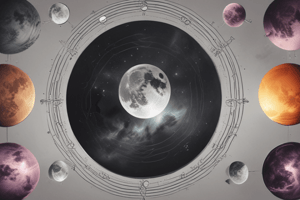Podcast
Questions and Answers
What is the primary reason the sun shines?
What is the primary reason the sun shines?
- Reflection of the moon's light
- Gravitational force from the earth
- Solar flares on its surface
- Nuclear fusion within its massive core (correct)
What causes the moon to shine?
What causes the moon to shine?
- Nuclear fusion within its core
- Reflection of earth's light
- Reflection of sunlight from the sun (correct)
- Bioluminescence
What is the moon considered in relation to the earth?
What is the moon considered in relation to the earth?
- Artificial satellite
- Planet
- Natural satellite (correct)
- Asteroid
What is the path an object takes as it revolves around another called?
What is the path an object takes as it revolves around another called?
What causes tides, moon phases, and eclipses?
What causes tides, moon phases, and eclipses?
What is the term for the tendency of orbiting objects to remain in motion?
What is the term for the tendency of orbiting objects to remain in motion?
Why is the full moon visible from earth?
Why is the full moon visible from earth?
What causes the moon phases?
What causes the moon phases?
When do eclipses occur?
When do eclipses occur?
What causes a lunar eclipse?
What causes a lunar eclipse?
What causes a solar eclipse?
What causes a solar eclipse?
What causes the moon to turn red during a total lunar eclipse?
What causes the moon to turn red during a total lunar eclipse?
What is the 'dark side' of the moon?
What is the 'dark side' of the moon?
What determines moon phases?
What determines moon phases?
How often do lunar eclipses occur?
How often do lunar eclipses occur?
Flashcards
Reason the sun shines
Reason the sun shines
Nuclear fusion within its massive core
Moon's shine source
Moon's shine source
Reflection of sunlight from the sun
Moon relative to Earth
Moon relative to Earth
Natural satellite of the Earth
Path of revolution
Path of revolution
Signup and view all the flashcards
Causes of tides, moon phases, eclipses
Causes of tides, moon phases, eclipses
Signup and view all the flashcards
Orbiting motion tendency
Orbiting motion tendency
Signup and view all the flashcards
Visibility of full moon
Visibility of full moon
Signup and view all the flashcards
Causes of moon phases
Causes of moon phases
Signup and view all the flashcards
Eclipse occurrence
Eclipse occurrence
Signup and view all the flashcards
Lunar eclipse cause
Lunar eclipse cause
Signup and view all the flashcards
Solar eclipse cause
Solar eclipse cause
Signup and view all the flashcards
Moon turns red during eclipse
Moon turns red during eclipse
Signup and view all the flashcards
Dark side of the moon
Dark side of the moon
Signup and view all the flashcards
Determiners of moon phases
Determiners of moon phases
Signup and view all the flashcards
Frequency of lunar eclipses
Frequency of lunar eclipses
Signup and view all the flashcards
Study Notes
Phases of the Moon and Eclipses
- The moon's visibility changes as it orbits the Earth, and the same side is always facing Earth due to synchronous rotation.
- The side of the moon that is never visible is called the 'dark side' of the moon.
- Eclipses occur when the Earth or moon blocks sunlight from reaching the other, happening during new or full moon phases when the moon, Earth, and sun line up in syzygy.
- Moon phases, such as new moon and full moon, depend on the moon's location in its path around the Earth.
- The changing appearance of the moon is called phases, with waxing and waning moons occurring before and after the full moon.
- Moon phases are listed in order from new moon to waning crescent, with specific amounts of the lit surface visible during each phase.
- A diagram shows the position of the moon relative to the Earth and the sun, depicting all moon phases at once.
- The amount of reflected light off the moon reaching Earth determines moon phases with the sun.
- Lunar eclipses occur when the Earth blocks sunlight from reaching the moon, happening 0-3 times per year during syzygy in the full moon phase.
- During a total lunar eclipse, the moon turns red due to refracted red-colored light waves from the Earth's atmosphere.
- Solar eclipses occur in the new moon phase when the moon blocks sunlight from reaching the Earth, happening a few times per year.
- Sun phases do not exist like moon phases, but it has higher and lower energy output phases and unpredictable solar storms.
Studying That Suits You
Use AI to generate personalized quizzes and flashcards to suit your learning preferences.




